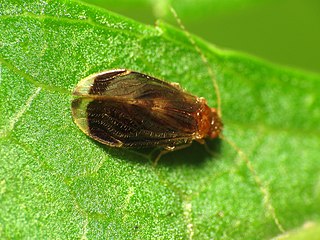
Psocoptera are a paraphyletic group of insects that are commonly known as booklice, barklice or barkflies. The name Psocoptera has been replaced with Psocodea in recent literature, with the inclusion of the former order Phthiraptera into Psocodea.

Psocomorpha is a suborder of barklice, booklice, and parasitic lice in the order Psocodea. There are more than 20 families and 5,300 described species in Psocomorpha.

Trogiomorpha is one of the three major suborders of barklice, booklice, and parasitic lice in the order Psocodea, alongside Troctomorpha and Psocomorpha. There are about 8 families and more than 430 described species in Trogiomorpha. Trogiomorpha is widely agreed to be the earliest diverging of the three suborders, and retains the most primitive characteristics.

Troctomorpha is one of the three major suborders of Psocodea (barklice, booklice, and parasitic lice), alongside Psocomorpha and Trogiomorpha. There are more than 30 families and 5,800 described species in Troctomorpha. The order includes parasitic lice, which are most closely related to the booklice family Liposcelididae.

Amphipsocidae is a family of hairy-winged barklice in the order Psocodea. Most species are 3.0-4.5 mm long and have many setae (hairs) on the veins and margin of the forewing. The main veins of the forewing are usually lined with two rows of setae. Like the other members of the infra-order Caeciliusetae, they have a broad, flat labrum, with well defined edges.

Peripsocidae is a family of Psocodea belonging to the suborder Psocomorpha. Members of the family are characterised by their absence of an areola postica in their wings. Many of the recently described genera are closely allied to Peripsocus. The family includes more than 300 species.

Ectopsocidae is a family of Psocodea belonging to the suborder Psocomorpha. The family includes fewer than 200 species, most of them in the genus Ectopsocus.

Homilopscocidea is an infraorder of Psocodea. It is probably a paraphyletic group, still in use for lack of a better solution. There are about 7 families and more than 1,200 described species in Homilopsocidea.

Psocodea is a taxonomic group of insects comprising the bark lice, book lice and parasitic lice. It was formerly considered a superorder, but is now generally considered by entomologists as an order. Despite the greatly differing appearance of parasitic lice (Phthiraptera), they are believed to have evolved from within the former order Psocoptera, which contained the bark lice and book lice, now found to be paraphyletic. They are often regarded as the most primitive of the hemipteroids. Psocodea contains around 11,000 species, divided among four suborders and more than 70 families. They range in size from 1–10 millimetres (0.04–0.4 in) in length.

Paraneoptera or Acercaria is a superorder of insects which includes lice, thrips, and hemipterans, the true bugs. It also includes the extinct order Permopsocida, known from fossils dating from the Early Permian to the mid-Cretaceous.
Ectopsocus meridionalis is a species of outer barklouse in the family Ectopsocidae. It is found in Africa, the Caribbean, Europe and Northern Asia, Central America, North America, Oceania, South America, and Southern Asia.
Lachesilla floridana is a species of fateful barklouse in the family Lachesillidae. It is found in North America.

Epipsocetae is an infraorder of psocids in the order Psocodea. There are about 5 families and more than 480 described species in Epipsocetae.
Ectopsocus richardsi is a species of outer barklouse in the family Ectopsocidae. It is found in Africa, Australia, Europe and Northern Asia, Central America, North America, Oceania, South America, and Southern Asia.

Lachesilla texana is a species of fateful barklouse in the family Lachesillidae.

Ptyctini is a tribe of common barklice in the family Psocidae. There are about 6 genera and at least 20 described species in Ptyctini.

Psocinae is a subfamily of common barklice in the family Psocidae. There are about 11 genera and at least 40 described species in Psocinae.

Paracaeciliidae is a family of bark lice in the order Psocodea. There are about 5 genera and more than 100 described species in Paracaeciliidae.
Spurostigmatidae is a family of lice in the order Psocodea. There is at least one genus, Spurostigma, in Spurostigmatidae.

Nanopsocetae is one of two major divisions of Troctomorpha in the order Psocodea, alongside Amphientometae. There are more than 20 families and 5,200 described species in Nanopsocetae.













